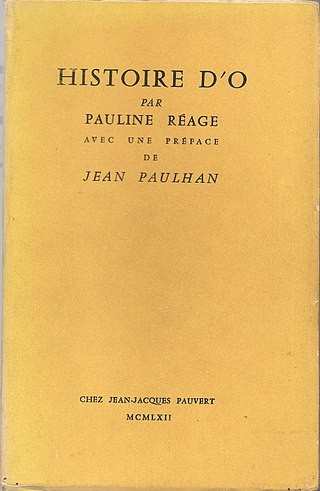
Joanna Russ was an American writer, academic and feminist. She is the author of a number of works of science fiction, fantasy and feminist literary criticism such as How to Suppress Women's Writing, as well as a contemporary novel, On Strike Against God, and one children's book, Kittatinny. She is best known for The Female Man, a novel combining utopian fiction and satire, and the story "When It Changed".

Story of O is an erotic novel written by French author Anne Desclos under the pen name Pauline Réage, with the original French text published in 1954 by Jean-Jacques Pauvert.

Eroticism is a quality that causes sexual feelings, as well as a philosophical contemplation concerning the aesthetics of sexual desire, sensuality, and romantic love. That quality may be found in any form of artwork, including painting, sculpture, photography, drama, film, music, or literature. It may also be found in advertising. The term may also refer to a state of sexual arousal or anticipation of such – an insistent sexual impulse, desire, or pattern of thoughts.
The sex-positive movement is a social and philosophical movement that seeks to change cultural attitudes and norms around sexuality, promoting the recognition of sexuality as a natural and healthy part of the human experience and emphasizing the importance of personal sovereignty, safer sex practices, and consensual sex. It covers every aspect of sexual identity including gender expression, orientation, relationship to the body, relationship-style choice, and reproductive rights. Sex-positivity is "an attitude towards human sexuality that regards all consensual sexual activities as fundamentally healthy and pleasurable, encouraging sexual pleasure and experimentation." It challenges societal taboos and aims to promote healthy and consensual sexual activities. The sex-positive movement also advocates for comprehensive sex education and safe sex as part of its campaign. The movement generally makes no moral distinctions among types of sexual activities, regarding these choices as matters of personal preference.
Sex-positive feminism, also known as pro-sex feminism, sex-radical feminism, or sexually liberal feminism, is a feminist movement centering on the idea that sexual freedom is an essential component of women's freedom. They oppose legal or social efforts to control sexual activities between consenting adults, whether they are initiated by the government, other feminists, opponents of feminism, or any other institution. They embrace sexual minority groups, endorsing the value of coalition-building with marginalized groups. Sex-positive feminism is connected with the sex-positive movement. Sex-positive feminism brings together anti-censorship activists, LGBT activists, feminist scholars, producers of pornography and erotica, among others. Sex-positive feminists believe that prostitution can be a positive experience if workers are treated with respect, and agree that sex work should not be criminalized.

LGBT themes in speculative fiction include lesbian, gay, bisexual, or transgender (LGBTQ) themes in science fiction, fantasy, horror fiction and related genres.[a] Such elements may include an LGBT character as the protagonist or a major character, or explorations of sexuality or gender that deviate from the heteronormative.
Samois was a lesbian feminist BDSM organization based in San Francisco that existed from 1978 to 1983. It was the first lesbian BDSM group in the United States. It took its name from Samois-sur-Seine, the location of the fictional estate of Anne-Marie, a lesbian dominatrix character in Pauline Réage's erotic novel Story of O, who pierces and brands O. The co-founders were writer Pat Califia, who identified as a lesbian at the time, Gayle Rubin, and sixteen others.
Patrick Califia, formerly also known as Pat Califia and by the last name Califia-Rice, is an American writer of non-fiction essays about sexuality and of erotic fiction and poetry. Califia is a bisexual trans man. Prior to transitioning, Califia identified as a lesbian and wrote for many years a sex advice column for the gay men's leather magazine Drummer. His writings explore sexuality and gender identity, and have included lesbian erotica and works about BDSM subculture. Califia is a member of the third-wave feminism movement.

On Our Backs was the first women-run erotica magazine and the first magazine to feature lesbian erotica for a lesbian audience in the United States. It ran from 1984 to 2006.

Coming to Power: Writings and Graphics on Lesbian S/M is a 1981 book edited by members of the lesbian feminist S/M organisation Samois. It is an anthology of lesbian S/M writings. It was a founding work of the lesbian BDSM movement.

Alyson Books, formerly known as Alyson Publications, was a book publishing house which specialized in LGBT fiction and non-fiction. Former publisher Don Weise described it as "the world's oldest and largest publisher of LGBT literature" and "the home of award-winning books in the areas of memoir, history, humor, commercial fiction, mystery, and erotica, among many others".
Women Against Violence in Pornography and Media (WAVPM) was a feminist anti-pornography activist group based in San Francisco and an influential force in the larger feminist anti-pornography movement of the late 1970s and 1980s.
Sheila Jeffreys is a former professor of political science at the University of Melbourne, born in England. A lesbian feminist scholar, she analyses the history and politics of human sexuality.
The feminist sex wars, also known as the lesbian sex wars, sex wars or porn wars, are collective debates amongst feminists regarding a number of issues broadly relating to sexuality and sexual activity. Differences of opinion on matters of sexuality deeply polarized the feminist movement, particularly leading feminist thinkers, in the late 1970s and early 1980s and continue to influence debate amongst feminists to this day.
Feminist sexology is an offshoot of traditional studies of sexology that focuses on the intersectionality of sex and gender in relation to the sexual lives of women. Sexology has a basis in psychoanalysis, specifically Freudian theory, which played a big role in early sexology. This reactionary field of feminist sexology seeks to be inclusive of experiences of sexuality and break down the problematic ideas that have been expressed by sexology in the past. Feminist sexology shares many principles with the overarching field of sexology; in particular, it does not try to prescribe a certain path or "normality" for women's sexuality, but only observe and note the different and varied ways in which women express their sexuality. It is a young field, but one that is growing rapidly.

BDSM is a frequent theme in culture and media, including in books, films, television, music, magazines, public performances and online media.
Feminism has affected culture in many ways, and has famously been theorized in relation to culture by Angela McRobbie, Laura Mulvey and others. Timothy Laurie and Jessica Kean have argued that "one of [feminism's] most important innovations has been to seriously examine the ways women receive popular culture, given that so much pop culture is made by and for men." This is reflected in a variety of forms, including literature, music, film and other screen cultures.
Feminist views on BDSM vary widely from acceptance to rejection. BDSM refers to bondage and discipline, dominance and submission, and Sado-Masochism. In order to evaluate its perception, two polarizing frameworks are compared. Some feminists, such as Gayle Rubin and Patrick Califia, perceive BDSM as a valid form of expression of female sexuality, while other feminists, such as Andrea Dworkin and Susan Griffin, have stated that they regard BDSM as a form of woman-hating violence. Some lesbian feminists practice BDSM and regard it as part of their sexual identity.
Feminist views on sexuality widely vary. Many feminists, particularly radical feminists, are highly critical of what they see as sexual objectification and sexual exploitation in the media and society. Radical feminists are often opposed to the sex industry, including opposition to prostitution and pornography. Other feminists define themselves as sex-positive feminists and believe that a wide variety of expressions of female sexuality can be empowering to women when they are freely chosen. Some feminists support efforts to reform the sex industry to become less sexist, such as the feminist pornography movement.








